#well i just wanted to clarify. i am happy its ending for purely political reasons. in a perfect world i would keep getting more rvb foreve
Text
i cannot fucking wait for this show to be over so i never have to think about this shitty company ever again
#the show will be ours now. they abandoned it#ftr i think the idea that rvb 'should have ended' at any point is stupid. rvb is a show that can run in perpetuity if you have good writers#i think 'it shouldve ended' is a very lazy critique. its one thats been lobbied against rvb since the end of season 5#if later seasons have problems its not because the show went on too long. its because the writing was poor#and saying that 'it shouldve ended' is saying that a decline in quality is inevitable.#and that both lets the bad writing off the hook and condescends to the writers.#this has become. a comepletely different conversation.#well i just wanted to clarify. i am happy its ending for purely political reasons. in a perfect world i would keep getting more rvb foreve
38 notes
·
View notes
Text
“Hope at Christmastime”: A CS Secret Santa Gift
Merry Christmas from your CS Secret Santa, @thislassishooked! I hope you’re enjoying a wonderful holiday season. From our exchanges, I decided that I wanted to do something from Killian’s POV that incorporated lights and decorations. And for some reason, I felt very strongly that I wanted it to be somewhat canon... so here you have it!
This is a season 1 mostly compliant one-shot in which Killian is a fisherman in Storybrooke, and he meets Emma and Henry a few times. Intrigued and oddly hopeful because of Emma’s fiery spirit, he embarks with her on a Christmas quest for bringing about joy.
It’s not pure fluff and leaves some to the imagination, but I felt like it stayed true to their kind of dynamic. I really, really hope you enjoy!
I know I’m a little early, but I’m sick as hell and worried that tomorrow I might not be conscious, so here you have it on Christmas Eve Eve :)
@cssecretsanta2k19
---
It was an odd feeling, being half in love with a woman you’d practically just met. But it had been years, decades, lifetimes, probably, since Killian Jones had encountered such a fierce, witty, engaging, interesting, and bloody gorgeous woman like Emma Swan.
He’d been living in Storybrooke, Maine… since forever, really. His brother had been in Storybrooke General since his accident years before – still alive, of course, but the doctors continually warned Killian against having any kind of hope that their lives would ever return to the normalcy of Granny’s for breakfast in the off-season and hard work lobster fishing the rest of the year.
It wasn’t just that Emma was the liveliest woman he’d met in ages, she was simply the liveliest being, as if she somehow was part of a totally different, vibrant world.
Storybrooke was… fine. It was safe. He made a living. The people were well enough – he enjoyed talking with Miss Blanchard, the teacher who often read to the coma patients in her spare time. Archie was kind and generous, if not a little bit condescending at times, but his dog was sweet and always made Killian smile. Even Dr. Whale was all right – understanding about the phantom pains from the loss of Killian’s hand that he couldn’t even remember.
But Emma? She was pure magic.
Rumor was she was the mayor’s son’s biological mother, and little Henry had dragged her from her home of Boston to Storybrooke because he was so damn miserable. It made sense. Regina Mills was possibly the least nurturing person he could think of in the whole of Storybrooke, and no one ever really understood why she decided to adopt a child. Henry was wonderful, though – Killian had always thought so. Precocious, inquisitive, kind… many traits he can now attribute to nature versus nurture.
The fist time he spoke with Emma happened to be while she and Henry were walking along the pier one afternoon. Emma’s brows were stitched together in worry, her voice low as she spoke to her son, the boy clutching a large children’s book and never breaking eye contact with her. It felt intrusive to even witness the exchange, but alas they were in his way, and there wasn’t much he could do to avoid them when he needed to get all of his supplies back to his ship without somehow losing another limb.
“Excuse me, love, Master Henry,” he mumbled breathlessly, twisting to the side to pass them by without knocking either of them in the head with something large and possibly rusty (when was the last time he’d gotten a tetanus shot? Did they even offer them at the hospital here?).
“Hi, Mr. Jones!” Henry called excitedly, rushing past his mother and following Killian onto the Jewel.
“How’s your day going, lad?” Killian asked after hefting the pile of supplies onto the closest surface. The boy looked happy, as usual, but seemed to have an extra glint in his eye.
“Henry, what the hell!” Emma shouted as her boots stomped onto the ship, her blonde curls now mangled from the seaside breeze.
“Don’t worry, I know him! This is Killian. He’s Captain Hook.” Henry said it so matter-of-factly that it didn’t even cross Killian’s mind to be offended about the possibly jab at his handlessness. The way Henry was talking you’d think he was just reading from a biography.
“Kid, what did I tell you about that? Operation Cobra is for you and I only, and, like I said, it might be time to take a little break from it.” Emma’s eyes were full of concern, genuine worry for her boy, but also fear. He knew that well enough from his vague recollections of the accident(s) that scarred him and rendered his brother near lifeless. What was she so afraid of?
His attempts to quell her worry were for naught, as she wasn’t about to trust a single hair on his body. “Love, the lad and I are great friends, aren’t we Henry?”
“I’m not your love. And Henry shouldn’t be running on board the boats of near strangers when I’m hardly trusted to keep him breathing let alone keep him from being kidnapped by Peter Pan.” Emma snapped.
“Mom, he’s Hook, not Pan,” Henry corrected, his tone that of an exasperated teenager despite the boy being no more than ten or eleven.
“I don’t care who he is, I’m not letting him be the reason I’m never allowed to see you again, Henry! You know if your mother knew that you ran onto some dude’s boat who apparently you thought was a pirate under my watchshe’d have me jailed. Again!”
“It’s actually a ship here, love,” Killian couldn’t help himself from pointing out, his amusement at her fiery attitude entirely inappropriate for what was clearly a very strong emotion she was experiencing. But it was simply so foreign to him, a person having… feelings. Beyond despair, anyway.
“Are you fucking kidding me?”
“Mo-om,” Henry chastised, though it wasn’t clear if he was offended by her language or embarrassed that she wasn’t quite a fan of Killian’s… sass.
(Killian hadn’t remembered a single other moment in his life where he’d said something so… unfiltered. Damn.)
“My apologies, love, I’m not sure what’s come over me. I’m usually much more polite. Henry, we all know your mother – Mayor Mills, that is – would look for just about any reason to throw this lovely fireball out of our town permanently. Emma is right to worry. Now how about you two go about your way and I’ll show you more about fishing the next time that Regina approves it?’”
“So, never?” Henry mumbled, rolling his eyes and walking toward the gangway. Emma turned to follow him, but Killian wanted one last chance to apologize.
“I really am sorry, love. I can’t imagine you’re having an easy go of it here in Storybrooke and I just wanted… well, I just wanted you to know that there’s at least one more person on your side than you thought.”
Emma finally looked back at him, incredulous, and Killian suddenly felt quite naked. Reaching to scratch behind his ear, he clarified: “Me, I mean. I’m also on your side.”
She rolled her eyes yet again, but a spark came alive in the smirk she shot back at him. “Good to know, pirate, but I’m not your love.”
From that day, he’d had numerous minor interactions with the Mills/Swan duo. He saw them at breakfast at Granny’s one morning, and Emma refused to so much as look at him, while Henry excitedly told him all about the website he’d used to find Emma (he glossed over how he stole his teacher’s credit card, a fact that Emma still appeared to be quite peeved about). The following week he saw the two of them at the playground that Killian passed on his way to his ship. He re-introduced himself to Emma, as she was yet to actually acknowledge she knew his name, but she only responded with some variant of, “OK Pirate,” which had led to her and Henry laughing like fools for at least five straight minutes.
About a week before Christmas, he finally ran into Emma without her son, and while he’d thought that was something he was hoping for – an opportunity to get to know her without her hiding behind Henry – he realized something awful. That fiery spirit in her – the one he so admired – was dimming. This town, it was getting to her. Was she doomed just like the rest of them to live forever without a happy ending? Or even a happy middle? Was this safe, sweet, seaside town nothing but dashed hopes and broken dreams?
“Uh, Miss Swan?” he asked, cautiously approaching the bench she was sat on, her blonde hair whipping in the breeze, her hands tucked tightly into her flame red jacket.
“What,” she called back, not even looking at him.
Even their non-conversations previously had been some type of banter, some kind of force in his dreary life, but today, she seemed defeated.
He didn’t know much about the world – didn’t really care enough to participate most days – but wasn’t this seasons supposed to be the one where you believed even more strongly than ever that everything might just end up being all right?
“Can I sit?
“It’s a free country.”
“My purpose in sitting with you is to speak to you, and while I could talk at you, I’m actually hoping you’ll talk back. Is that a reasonable wish or shall I keep on moving?” With great effort, he kept his voice light and teasing, when in reality his heart was breaking right along with hers. From what he understood about her life, Henry was new to it, but had nonetheless become its center. He couldn’t imagine what it would be like to have had hope dangled in front of your face only to possibly have it snatched away.
Instead of snapping back at him, she slowly lifted her head, swept her hair to the side, and patted the seat next to her. “Why would you want to talk to me?” she asked, her eyes once again trained on her feet.
“You look like you could use a friend.”
“I don’t have any friends.”
“You could. I’m here,” he offered.
She exhaled deeply, shaking her head and gripping the bench at either side of her legs. “I don’t know what I’m doing here. I have no right to Henry… I had him young and gave him up for his best chance. And, as usual, I was wrong. And as usual there’s nothing I can do about it now. I’m fighting a losing battle. It’s not like anyone can defeat Regina.
“Oh, I wouldn’t say that. You’ve certainly gotten under her skin.”
“Yeah, making it all worse for Henry. I’m just being selfish here, aren’t I? Wanting my son back because he says his rightful mommy is an evil queen? I’m sure that’s something a lot of kids his age feel. I just… I just wanted to be wanted, I guess.”
Killian let his right hand graze the back of hers as he shifted slightly closer to her. When she didn’t flinch away, he allowed his hand to fully rest on hers, squeezing ever so slightly.
“You’re not making Henry’s life worse by being here. Believe me, Emma. I know you don’t know me and I don’t know you, but I have eyes. Henry has always been a bright spot in an otherwise lightless town, but since you’ve arrived it’s like he’s a whole new kid. Confident, excited, hopeful. And don’t discredit what you’ve done for everyone else. Miss Blanchard seems happy to have a roommate. Ruby loves when you visit with her at the diner. Granny seems to think of you as a surrogate granddaughter. Our world was black and white and you brought us color, love.”
The shock in her eyes at his words was enough to both warm his heart and enrage him – it’s not as if he was saying anything that should be surprising to her. Who in her life had made her feel so worthless and how soon could he stab them through the heart with his hook?
You know, if he had one.
But her shock wore off as a bit of mirth seemed to take its place. “Now, I can’t take credit for all of that. Granny likes the money I spend. And Mary Margaret… let’s just say I’m not the one fucking her, so I’m definitely not the reason for the extra smiles.”
“Miss Blanchard!” he gasped theatrically, clutching his heart and hamming it up.
“Oh yeah. You might be the native here, but I know all the secrets, friend.”
“So tell me another.”
“Hmmm. Granny’s lasagnas are frozen.”
“No!” This time he was actually shocked. That crazy loon…
“Oh, yeah. And her nonfat pizza crust? Definitely still has fat.”
“That’s it. I’m calling the health inspector.”
“You know, we don’t have one. I think you’d have to call the sheriff,” she chuckled, flipping her hand over on the bench so her palm was against his.
“Hmmmm, think I have an in with her? I’ve heard she’s a spitfire.”
“I don’t know. Depends on the day you approach her. I’ve heard she has mixed feelings about you, Jones.”
“Oh, so you do know my name,” Killian teased, adjusting the fringe around his hat with his stump.
“I tend to remember the people who try to annoy me to death,” she deadpanned, but he caught the ghost of a smirk at the corner of her lips.
“What if, insteaed of annoying you to death, maybe you let me help you?” Killian offered, absolutely no clue what exactly he could offer her when she wasn’t wrong about the futility of fighting with Mayor Mills.
“Hey now, I’m no damsel. No one saves me but me,” she said, pulling her hand from beneath his and tucking it back into her jacket.
“Easy, love. I’m well aware that you’re more likely than any other person in this god forsaken town to actually have some success at anything.”
“You been reading Henry’s book?” Emma turned fully toward him for the first time since he sat, her cheeks red and her eyes dancing with cautious amusement.
“No, I haven’t had the pleasure. Why?”
“Well. According to his book, I’m here to save everyone. Bring back the happy endings.”
“Oh? And where exactly have they gone?”
“The Evil Queen – Regina, actually – has ripped them from you. But I, the daughter of Snow White (Mary Margaret) and Prince Charming (the former coma patient she’s been banging) am the ‘product of true love’ and therefore can break the curse.”
“Damn, you should sell that shit to Disney. You’d make a fortune.”
“Hah. Maybe I should. It’s about the only way I could ever afford to fight Regina the real way, you know with lawyers and money and not … magic.”
It struck him at that moment how true Henry’s story actually rang. Sure, there was no way it was actually real, but hadn’t Killian himself thought countless times how full of life Emma was, how she seemed magical in a world of nothing but ordinary hopelessness? Even if he didn’t believe Henry’s story… scientifically, or what have you – he believed it in his heart.
Emma might not be an actual princess, but she definitely had the power to save. And he’d do anything he could to help her.
“It’s the season for magic, you know?” Killian pointed out, gesturing vaguely toward the wreaths haphazardly hung on the lampposts that led back to main street.
“Are you going to help me achieve a Christmas miracle, Killian?” She reached back toward him and took his hand, squeezing as her eyes sparkled with a plan.
“I’m damn well going to try.”
Together they stumbled through the slippery streets toward Granny’s, armed with an idea and the hopes that Ruby would facilitate their ridiculous plan to bring Henry as much joy as possible, even if Emma couldn’t directly be involved.
“So, you’re telling me you want me to let you decorate the shit out of this place, just so Henry sees it?” Ruby questioned, her one eyebrow nearly touching her hairline, her face so skeptical.
So Killian jumped in. “Listen, Ruby, you know damn well fighting with Regina never ends well. We just have to give the kid some hope. Believing in even the possibility of a happy ending is a very powerful thing.”
“Are you sleeping with Mary Margaret now, too, because damn that girl gets around.”
“Ruby!” Emma shouted, smacking her on the arm.
“What? Have you seen him? If Mary Margaret isn’t taking her chance with him and you’re not interested, then hello sailor, fancy taking me for a ride?”
“Ruby, fucking focus yourself. Can you help us? And by help us I mean literally offer free decorating service that will likely increase your tips?”
“Oh, fine. For Henry.”
“For Henry!” Emma and Killian repeated, scurrying off to whatever store they could find that carried Christmas lights, tinsel, blow-up polar bears, and any other kind of purchase-able holiday joy.
Once they’d filled three whole carts, they rolled them back to Granny’s, sat down to sip hot chocolate until close, and then went to town, covering every surface with glittery tinsel, jingle bells, reindeer, elves, and pretty little lit-up presents. Killian borrowed a ladder from the short pharmacist so he could string icicle lights across the courtyard outside and Emma filled the big windows at the entrance with those giant bulb style lights of all different colors. At some point after 2am, Ruby texted Emma that the electricity bill was going to be something she’d have to take up with Granny, but Emma just laughed and Killian said he’d pay it and they kept decorating until about 5am when Granny appeared to start baking in preparation for the morning crowd.
“I’m not even going to ask,” was all Granny said to Killian as she entered her now Christmas paper-wrapped front door and Killian’s heart definitely grew two sizes or more when his eyes traveled over to Emma, carefully arranging the Hallmark Disney castle on the ledge next to the table that Henry and Regina often sat at when they stopped there before school.
It was a losing battle they were fighting, Killian was sure of it – nothing in Storybrooke ever led to winning for anyone who wasn’t Regina Mills. But one look at Emma and all he wanted to do was keep fighting, keep trying, keep hoping that one day their world would be full of happy endings again.
Someday.
65 notes
·
View notes
Text
Marvel Cinematic Universe: Captain America: The Winter Soldier (2014)
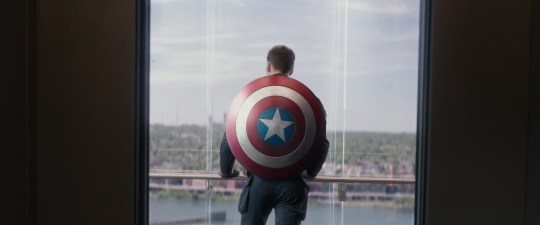
Does it pass the Bechdel Test?
Yes, once.
How many female characters (with names and lines) are there?
Five (29.41% of cast).
How many male characters (with names and lines) are there?
Twelve.
Positive Content Rating:
Three.
General Film Quality:
No matter how many times I watch this, I’m always surprised by how excellent it is. If any other future Marvel film wants to be ‘the best’, this is the movie it has to beat for the title.
MORE INFO (and potential spoilers) UNDER THE CUT:
Passing the Bechdel:
Natasha asks about the ballistics on the weapon used against Fury, and Maria responds. I’ve heard people argue that Natasha was not asking Maria specifically and therefore this does not count, but since Natasha clarifies a detail of Maria’s response (to which Maria responds again in order to confirm), I definitely think it qualifies. I have allowed a pass for far, far less in the past.
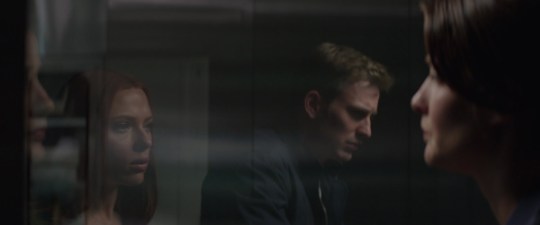
Female characters:
Natasha Romanov.
Peggy Carter.
Maria Hill.
Sharon Carter.
Renata.
Male characters:
Steven Rogers.
Sam Wilson.
Brock Rumlow.
Georges Batroc.
Jerome.
Jasper Sitwell.
Nick Fury.
Alexander Pierce.
Aaron.
Arnim Zola.
Senator Stern.
Bucky Barnes.
OTHER NOTES:
They start this movie by having Steve go for a jog and make a new friend, with a conversation ensuing that is by touches casual, light, humorous, insightful, serious, and sobering. It’s a pretty weird way to launch a much-anticipated superhero comic-adaptation action movie sequel, to be honest, but it’s also rock-solid character establishment - for the never-before-seen Sam Wilson, and for Steve Rogers whose mental state and coping skills in the modern era are kinda an open question at this point - and by getting us on level with Steve’s day-to-day (rather than Captain America’s, which comes after) they’ve immediately prepped us for a story in which this character confronts and reassesses who he is and what he stands for at a core level, and not just in a symbolic/legacy kind of fashion (a la Tony Stark). It may say ‘Captain America’ on the tin, but this is Steven Rogers’ story. This is a fantastic and well-condensed first three minutes of this film, before they fly off to deliver the action sequence we may well have expected to have received up-front.
Oh yeah, also this opening scene involves jogging around the Washington Monument, which is not a subtle detail, but I can dig it. If they’d had Steve draw attention to some Major American Landmark at some point in the movie and make a patriotic declaration of some kind, then I’d cry foul, but as-is the use of Washington DC as a setting is the hardest they bother to hammer the AMERICA button. The absence of self-fellating patriotism which I appreciated so much in the first film continues to be a virtue in this one. I do dig.
Remember how I really love it when people get hit and fly off the screen? Steve just kicked a dude off a boat and I made the dorkiest ‘hee hee!’ noise ever. Sure am glad the only reason anyone knows about that is that I just told y’all, and not because anyone actually heard me.
One day, we’ll stop getting these kinds of gratuitous butt shots of female characters in tight clothes. But it sure ain’t this day.
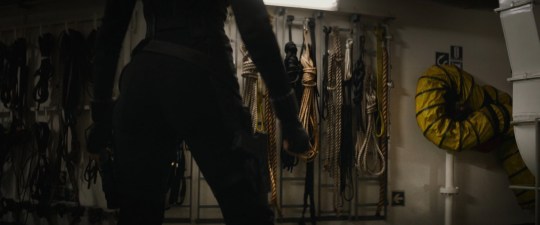
In a world of equal-opportunity sexualisation, this Cap-butt would be forgiveness enough for the aforementioned offense. But it still sure ain’t that day, friends.
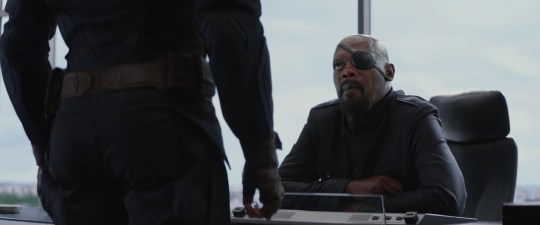
Other reasons to love that opening scene: they low-balled Sam’s counseling skills to us by having him quickly identify the best way to speak to Steve and to engage with him (as Steve, again, not as Captain America; that’s the key), and that’s what allows Steve to bond with him enough that, put in a tight spot and not sure who to trust, he shows up on Sam’s doorstep later in the film. Really tight characterisation and dynamic-building.
ALSO, Steve’s adventure to the Captain America museum exhibit reminds us all of what he’s lost - specifically, Bucky Barnes - and contextualises his encounters with Sam Wilson within the emotional landscape of Steve’s desire for close male companionship, highlighting the need which compels the formation of that bond while also accentuating the sense of Steve’s present isolation and uncertainty, robbed of any understanding confidante (the bittersweet reality of having Peggy Carter still alive, but losing herself to Alzheimer's, really hits that one home). Again, Steve’s emotional landscape is actually a vital part of the story of the film on both character and plot levels, so there’s a LOT of great show-don’t-tell demonstration in the interconnections of all these scenes, PLUS they’re doing the good work for all the other characters involved AND reminding the audience of the score so that the film can continue to draw from the past as the movie continues, without losing any viewers for whom this might be the first foray into the Captain America story. This movie is just...really well put together, guys. It’s a little shocking, how good it is.
Winter Soldier intro is too cool. Not a pun.
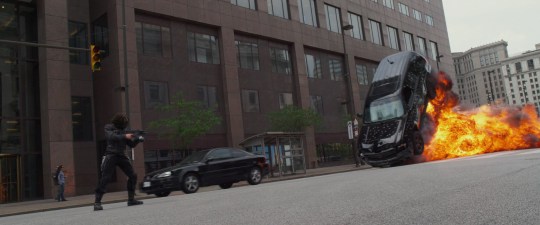
Steve takes a chance and asks his neighbour out for coffee; she declines with a soft no; he accepts even-tempered and assures her he won’t trouble her any further, and she lets him know that he’s no trouble and there’s no hard feelings. It’s all a very painless and respectful navigation of boundaries, and taken on face value (ignoring the part where she turns out to be an undercover SHIELD agent, and everything which unfolds from there), it’s a welcome example of how easy it is to take rejection graciously. Guys, be the Steve Rogers that women want to see in the world.
I want a metal arm. I don’t want to not have my current arms, they’re fine, but in an abstract version of the world where you have things purely for cool points, I want a metal arm.
The fight choreography in this film is great. It’s good watchin’.
Also the soundtrack is top-end.
“...Specimen.”
The movie didn’t need a hetero kiss thrown in there, though. I sure wish there wasn’t a random kiss in there.
“The answer to your question is fascinating. Unfortunately, you shall be too dead to hear it.”
Urgh, why Senator Stern gotta show up, be a pig about women, make his little Nazi declaration, and leave? The answer is, he really doesn’t gotta. You know what’s good shit? Not using misogyny and objectification of women to demonstrate that a bad guy is a bad guy, unless it’s actually a relevant part of the story. One day...
I can’t deal with how cool the Winter Soldier is. I’m almost embarrassed by how much the whole Silent Sauntering Assassin thing works for me.
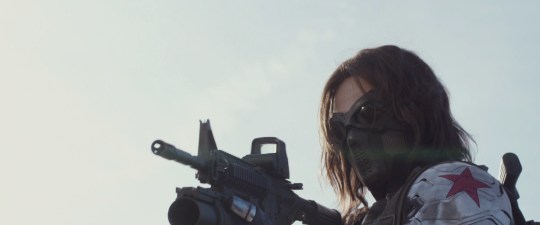
Sam Wilson brings a tiny knife to a gunfight and still gets the upper hand because he’s perfect.
THE FIGHT CHOREOGRAPHYYYYY
The Winter Soldier is barely in the film in the first hour, and Bucky is referenced in the museum but not discussed by any of the characters, so there’s no lantern hanging on either the mystery of the Winter Soldier’s identity or the conspicuous reminder of a supposedly dead character (another reason why tying the memory of Bucky in so tightly with Steve’s present state of comfortless seclusion is important and clever). If you somehow managed not to be spoiled for it already, the Bucky reveal is a real kicker of a twist.
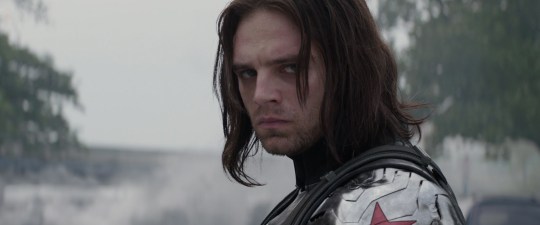
The degree to which I adore Sebastian Stan’s attention to detail in his performance has increased tenfold since The First Avenger. Dude has got nuances on his nuances.
The part of me that is emotionally susceptible to heroism is very moved by all the nameless SHIELD agents who stand up to HYDRA and die for it.
I join the rest of the world in being really disappointed that what appeared to be Jenny Agutter’s councilwoman kicking Strike Team ass was actually just Black Widow. Sorry Natasha.
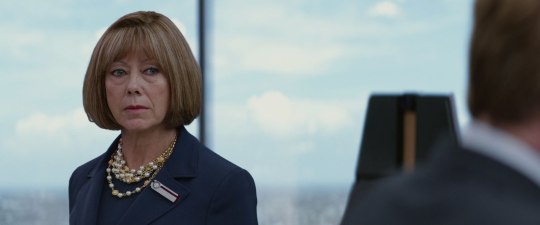
The Winter Soldier shows up and murderises a heap of pilots, and the part of me that is susceptible to heroism finds itself in conflict with the part that is susceptible to the Winter Soldier’s ineffable coolness (which is itself at odds with the part of me that wants Bucky Barnes to be safe and happy). This movie got me good.
Rumlow talkin’ some shit about pain and Sam’s just like “Man, shut the Hell up,” and it’s perfect. I love him.
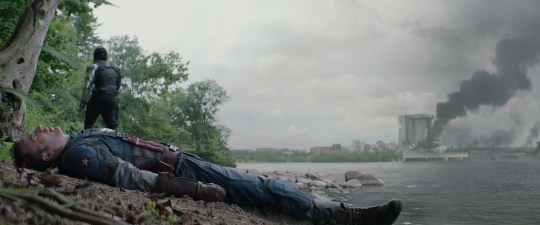
I love this film. I mean I really, really love it. Like, I mean this is one of my favourite movies in the world. Like, if we were playing that ol’ game of ‘if you had to pick ten movies, and those were the only movies you were allowed to watch for the rest of your life’, this would be one of my ten movies. That’s how much I love this film. There’s so much to get into here, so much to enjoy: it’s light and easily-digestible enough for when you just want to be entertained by something that doesn’t demand too much from you, but it also has serious depths for when you’re in the mood to dig in. It has well-crafted action scenes, but also a strong plot with powerful emotional currents. It has wonderful, charismatic actors playing intriguing characters, and most of them are good eye candy, but none of them are just eye candy - there’s a lot of complexity to unravel in the motivations and personal narratives of the leads. It’s a superhero movie, sure, but it’s also a political spy thriller. And, to top it off, it’s not only an excellent stand-alone film, it’s also a fantastic example of how to do a sequel right.
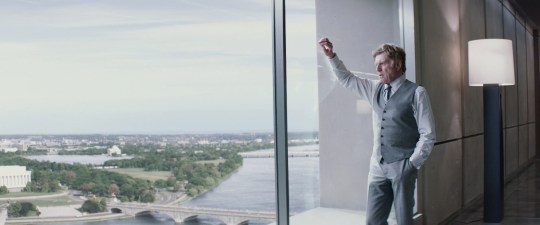
Sequel-making can be a fraught business; you’ve got sequels that are basically just pointless retreads of the original, sequels that are so different they hardly count as sequels at all, sequels that are so busy trying to be ‘bigger and better’ than the original they become ridiculous, sequels so busy attempting to capitalise on the spectacle of the original that they forget to have any of the same heart that gave the original meaningful impact, sequels that ignore that the original had a plot and themes and that maybe that stuff was relevant to its success, etc, etc...there are lots of great sequels in the world, certainly, but as Iron Man 2 and Thor: The Dark World already attested for the MCU, it is very, very easy for sequels to go wrong. For this film, I think it goes without saying that I feel they passed all of the above sequel-killing quality tests with flying (low-key red-white-and-blue) colours, hence my adoration. But, just for kicks, lets talk about how they did it.
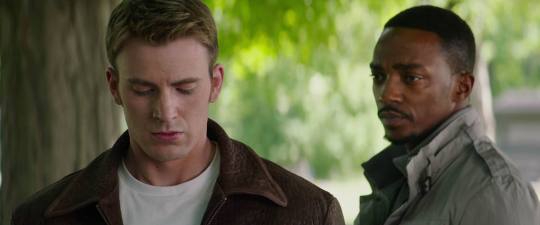
For starters, you can pretty much guarantee that this isn’t gonna be a pointless retread of Captain America: The First Avenger, since this movie takes place seventy years later and there are certain essential world elements that have fundamentally changed, such as technology, characters, and the fact that WWII ended a good while previous. But, that’s exactly how they make this story work as a sequel: they use the nature of change to give the film its shape, thematically, politically, emotionally, and in doing so they assure that everything which is different in the present builds directly from the past. Steve Rogers has not fundamentally changed, and that’s a critical anchor, considering he’s the titular character and all, but he is in a state of flux due to everything else that has changed, and his doubts inform the narrative landscape. This is not the world he remembers, and yet, as the plot unfolds and he digs into the conspiracy at his feet, there’s plenty there that is hauntingly familiar, because this is a story about how the past is still alive and kicking in the present, it has just updated to keep with the times.
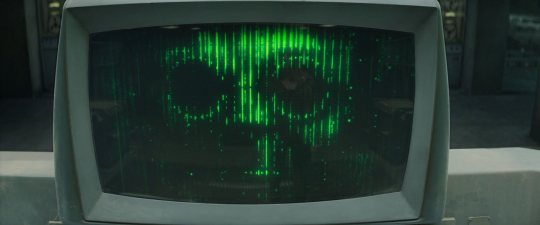
It’s worth noting that despite Captain America making the jump from the forties to the modern age without any stop-offs in between, the film doesn’t linger on or wallow in the differences in his world in any strict sense - even Steve himself (in that EXTREMELY well-crafted opening scene with Sam) is somewhat dismissive of the specifics, because he’s not dwelling on the oh-woe-things-have-changed, he’s just trying to get his head around it, adapt, and move forward (and the practical realities are easy enough, but the emotional facets? Yeah). The thing is of course, no one else shares this problem with Steve; they’ve all been around, variously, for the parts in between, and the story is still concerned with the context of the world which made all of its characters what they are, and particularly with the war that came after WWII, the war within which HYDRA reseeded and began to grow anew: the Cold War. In particular, it’s the ‘70s/’80s era Cold War, built into the political-thriller superstructure of the film itself and driven home most overtly by the Winter Soldier, heavily Russian-coded and steeped in the potent psychological horror of brainwashing, but there are other signifiers littered across the story as well. There’s former-KGB agent Black Widow, and the reference she makes to WarGames, and there’s Arnim Zola frozen in time by the ancient computer system which now acts as his ‘brain’, and then there’s the stroke of subversive genius in the casting of Robert Redford - the positively Captain America-esque blue-eyed-blond hero of many a seventies Cold War political thriller - as our primary villain, working within the United States government for the benefit of his secret European-originating agenda in true foreign-infiltration style. Of course, we can adapt all of this to fit the radicalised terrorism and technological paranoia of modern times (and those elements are alive and well in the text with the surveillance-state fears represented by the helicarriers), but the historical timestamping is important to the trajectory of the film; times change and things grow increasingly subtle and complicated, but the core dilemmas that call people out to fight are instantly familiar. In that sense, Steve Rogers hasn’t missed much at all.
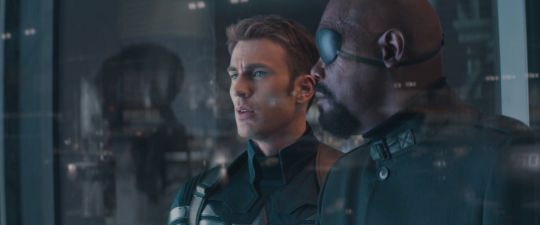
The war that calls Cap to arms this time around may be more subtle than the openly-fought battlefields of WWII, but it is no less global or insidious; the new ‘improved’ HYDRA may not be led by a literal Nazi who peels off his own face, but the cold political calculations of Alexander Pierce are much more frightening for their realism (an aspect of the film which has become increasingly prescient for the modern era since the movie was released), and the fascist supremacist dogma that compels these villains to attempt to reshape the world with the blood of millions is drawn from the same poisoned well; this is an escalation of the same enemy that Captain America faced before, only much closer to home. And while the passage of time has benefited the old evils in allowing them to entrench and fester and craft re-branded, more socially-accepted versions of themselves, it has not been so favourable to the positive familiar things from Steve’s past: it has claimed Peggy’s memory, and rotted SHIELD beyond recovery. And then, there’s what it’s done to Bucky Barnes.
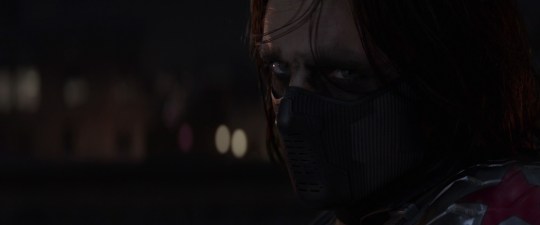
Fake-out character deaths are a major staple of the superhero/comic genre, and not one I love, since it tends to take the power out of apparent-death scenes and leaves the drama feeling contrived, and while the Bucky reveal is not entirely free from that cynicism, it sells itself well on delivery. For starters, it packs a wallop in additional drama instead of just neatly undoing that which already existed (Nick Fury’s ‘death’ and reveal, on the other hand, is more in the classic line of cheap and inconsequential), and it ups the personal stakes for Steve in exactly the same way as Bucky’s ‘death’ did in The First Avenger. Crucially, the fact that Bucky is the Winter Soldier doesn’t alter the wider narrative in any convenient way, such as providing Captain America with the key to stopping him or resolving the other conflicts of the plot through his connection; the Bucky reveal reconnects the story to Steve’s emotional journey, which is exactly where it started before Shit Got Crazy - there’s a good reason they spent the first half hour of the movie on charting Steve’s mental state. There’s a sharp division between Bucky Barnes and the Winter Soldier, despite them both inhabiting the same form, and it’s a mirror of the division between Steve Rogers and Captain America: regardless of all assumptions to the contrary, the two are mutually exclusive entities. ‘Captain America’ is not a person, he’s a symbol, and he’s manipulable in that way, he can be propagandised, his image and actions are a tool turned to the purposes of others at the expense of the human underneath; Steve recognises this (and has since the first film), and he holds this secondary persona at a remove and does not define himself through it. This is what Sam’s keen social instincts pick up so quickly in the beginning: treating Steve as Captain America is the wrong approach, it fails to connect, because Steve is not the uniform, Steve has doubts, Steve could give up the shield; Steve is a person. Bucky doesn’t have the same luxuries, in opportunities, in company, or in the cognizant ability to define his own identity, but even without the personal attachment of their history, Steve is uniquely positioned to understand the difference between the Winter Soldier and the person buried beneath the title. If it was not Bucky, specifically, the visceral emotion of the mirrored experience wouldn’t land quite as strong, but either way the Winter Soldier is the realisation of Steve’s deep-seated fear of being made a puppet, an unthinking enforcer too heavily indoctrinated into patriotic subservience to recognise the despotism that has replaced his idealism.
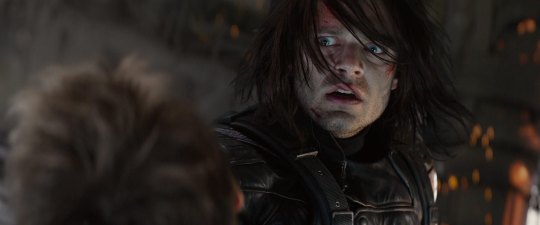
I said at the top that this is, ultimately, a Steven Rogers story to which ‘Captain America’ is an accessory, and not the other way around, and that’s a fact at the heart of what makes this film work - on its own, and as a sequel. The fore-fronting of Steve as a character in his own right and not just ‘Captain America’s real name’ was key to avoiding any cloying patriotism overriding the narrative of the first film, and it’s doubly important now as both Steve and the Captain America brand re-situate outside of their original context. It’s easy to strip back the specific trappings of Captain America and still have this movie function just right, because for all the action and intrigue, it is essentially a character piece about Steve Rogers figuring out his place in the world and reclaiming the moral compunctions which have been presumptuously attributed to the lofty symbol of his alter ego, and not the struggling reality of everyday life. Captain America is what he is and how he is not because it sounds good or because it makes for positive PR or because it’s nice to have legends from the good ol’ days; Captain America is the embodiment of scrappy little Steve Rogers’ grit and determination to live up to what he believes in, come Hell or high water or the gravest of consequences. Steve begins the film at odds with himself, unsure if there’s a place for his shameless idealism within the mess of modern life; he’s going through the motions of being Captain America, but he’s uncertain of what it means to him at this point, or where it’s headed. He finishes the film having gained something vital: a mission, but it’s not a professional job for Captain America, it’s a personal mission for Steve Rogers, and that’s much more important. Captain America is just an idea; Steve Rogers is the reason it matters, no matter what war, what time, what place, or what flag.
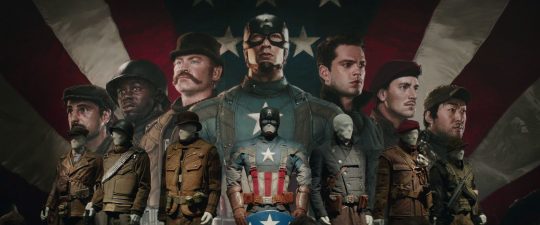
#MCU#Marvel Cinematic Universe#Captain America: The Winter Soldier#Bechdel Test#female representation
17 notes
·
View notes
Text
It’s “just” fiction.
How many of us have come across the typical phrase "it's just fiction"? Starting from a personal basis, I have always found it as a justifying sentence of an author with its content. And if the author has to get away with this defense, it is because someone has previously questioned said content.
To begin with, I will clarify a point. Writing about a murder does not make you a murderer, just as writing a rape does not make you a rapist; role-playing a sadistic and abusive character does not make you that character, acting in your real environment just like them.
In the world there are people who know how to separate the line of fiction and reality very well, while others do not. However, this is not the focus of this essay. I wanted to focus on the undervaluation of fiction in that very phrase "it's just fiction." I am going to articulate it with several examples that have occurred or continue to occur in reality, in addition to raising a series of questions.
For better or for worse, the news media have configured a heritage of History. We are aware of History because there is written and / or audiovisual material, but the story offered by the media may not represent History itself. We know the version of history that they tell us.
If I have gone to a very current example, the simple fact of creating a story in the format of an informative speech does not always reflect 100% of the object that occurred.
With information abuse (the saturation of information) and so-called fake news, they also have the possibility of affecting the user's conscience, despite being a totally invented, fictitious story.
Again, for better or for worse, and putting history and the media together, people tend to learn history more easily with fiction series. The fictional discourse can be educational and, at the same time, not represent History as such, trivializing some political aspects or creating a polarized world of black and white; good vs. bad.
I also wanted to highlight a sociological experiment that was carried out on television, replicating Milgram's experiment.
Milgram's original experiment, now cataloged by several experts as immoral, reflected very favorable results for the scientific community in its day. His main objective was to study the forms of obedience and whether they could find connection with those condemned during the Nazi era. Translated to the television world, in the documentary The Game of Death, they wanted to see to what extent a game show could become an authority, in addition to coming up with several theories.
Like the original experiment, an agentic state (sometimes conformism too) was found in the contestant, relegating all authority to the guidelines of the program. There is an additional theory that mentions “belief perseverance”. In the contest, electric shocks are given to a subject who cannot be seen but can be heard. As the program progresses, the greater the intensity of the shock. Obviously it is an experiment and the pain is acted out, but in the participant —who did not know that they were part of the experiment— the following belief came up: "I can't really be hurting him because this is television."
“This is television” as a synonym for prior planning and pure spectacle; as a synonym for falsehood; just fiction.
I mentioned this example because, especially at the beginning of the documentary, it denounces a normalization of violence and physical and emotional torture on television. It denounces, also at the end, that commercial televisions, in their desire for money, "teach us that it is normal to humiliate, eliminate and be sadistic." (It’s an old documentary but if you want to see it, click here. It’s in French, I’m sorry).
Continuing with sociological experiments, how many experiments have tried to study the link between violence and video games? Or sexism and video games? Or xenophobia and video games? Or nationalism and video games?
It should be said that the last mentioned are more common in the attitude of the player, using the video game as an expressive way to say whatever they want. However, we cannot ignore that, like historical television series, video games can also serve for nationalist discourses by demonizing the enemy and sanctifying themselves (especially when talking about video games which main topic is war).
I do not wish to dwell too much on each of the questions raised, since the emphasis is not the result of these experiments, but the undeniable interest and concern on the community of experts, as well as more and more students who are interested in these problems in order to analyze and debate them.
We are not indifferent to the images or books we consume. No matter how invented a story is, it stirs up real emotions. We grow with the media (traditional or digital media) and the content they have to offer us. There is socialization with the media at a very early age, and when we grow up we continue to learn from them.
Media acts on our emotions. And the stories that are told to us through media help to frame a collective imagination that even affects the vision of reality itself. Reality can also help build fictional worlds. And so the cycle would begin, since new ideals in fiction can act as a mirror for a future society and/or perpetuate harmful values (especially when under romantic treatments). They are two worlds that feed into each other.
For this reason the famous so-called "romantic love" has been so analyzed and criticized for promoting toxic ideas such as 1) love is the final happiness of every person and we are not complete otherwise, 2) we must to depend on someone else consider ourselves a "whole", 3) "for love everything is forgiven", "true love is eternal" and more idealizations that impacts on society and its perspective of love.
(Closely linked to romantic love, monogamy has been accused of being toxic and I wanted to make a small point that the decision of a closed relationship is as valid as an open relationship, and that an open relationship can be as toxic as a closed one. Here everything is said).
If fiction lacked that power, censorship would never have existed. The witch hunt in Hollywood or censorship that existed in the USSR for the control of the media and its content should not have happened. And many more historical contexts that I am ignoring. Governments were afraid of a content contrary to the predominant ideology, because it could break and violate their established values.
If fiction lacked power, propaganda would also lack power. Propaganda, especially in the context of dictatorships, offers a cult of personality; they idolize, endow dictators with divine values.
We just have to see the television advertising: it is all an idealized, invented version of the product. Don't give me that you've never been disappointed in buying the real product because "it wasn't like it was on TV."
We just have to see how certain groups in society (racial groups, different sexual orientation and gender identity groups, cultural ...) demand to be participants in fictional stories because fiction configures a mirror of the real world, where they are already participants.
Okay, taking a step closer to the "it's just fiction" statement ... so why do film academies exist? Depending on the film, they work with fiction to a greater or lesser degree, but it is still fiction. Why would there be jobs that are dedicated to worlds which work with fiction, if that is worthless? If "it was only fiction" nobody would pay for a movie or a book. And the same happens with television and animation series; no one would consume them. Any story that contains fiction, that is, any made-up story (depending on the needs of the script and the historical context), has no value.
By the same logic, any literary work would not have survived in memory and the writers we know as the "classics" would no longer be. By the same logic, any artistic movement (theater arts, literature, audiovisual and more), would have fallen into oblivion and its formal codes by which they acquire identity, would not be worthy of analyzing and studying.
Because what difference does it make. It is just fiction. Nothing happens for the massive creation of very questionable content (the topics of which this blog will address later).
Continuing with this essay, does anyone remember 50 Shades of Grey trilogy? Yes, that mess that originated (if I remember correctly) as a Twilight bad fic. How much movement was there on social networks denouncing an abusive and toxic relationship? Apart from BDSM and the criticism that it was painfully written (I started reading it by laughing and ended up wanting to tear my eyes out), there were countless posts in which the relationship of the characters was analyzed. Many voiced their complaint and amazement at how a book that focuses on and romanticizes a toxic relationship could hit the market.
I suppose that something problematic is even more when it becomes popular and it is about making money with it. And probably publishers don’t give a damn because they're going to make money anyway. Although the world of FanFiction is not destined —in principle— for commercialization, the fic that romanticizes problematic subjects is not "less important" for this reason, because it can do the same damage. There is a vast "FanFiction culture", and more than one fic has made the jump to the market. We have all seen a book with its brilliant promotion of "phenomenon on Wattpad".
Fickers —writers of FanFiction— are not film or television producers. It is good that FanFiction (and like FF we have Wattpad and AO3) is not a strictly professional universe. A fic, like a movie or a television series or a video game, can narrate very murky and dark things from life. A story can talk about drugs (or other types of addictions), the inhumanity of war, torture, sexism, rape, pedophilia and more that I’m ignoring. You can do it from the critical perspective of the characters and their actions, or from the point of view of the addict, inhuman, sadistic, sexist, rapist or pedophile respectively with the aforementioned.
Why if the producer/writer who whitewashes the image of pedophilia or terrorism (for example) or romanticizes them is considerated as a pedophile or as a terrorist but nothing is said against romanticization and the subsequent normalization of rape in the FanFiction world?
That question is one of many examples of harmful behavior by content creators, which toxicity can be seen thorugh fiction. That question is one from many others that this Tumblr account wants to develop as essays.
Because fiction is not “just” fiction. Whoever wants to rely on this phrase, is the equivalent of being a shameless person... as something to begin with.
1 note
·
View note